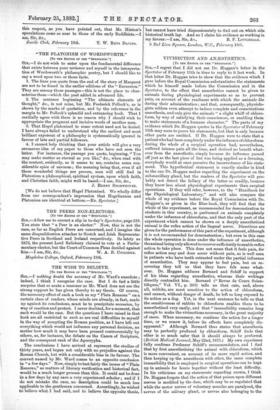THE WISH TO BELIEVE.
[To THE EDITOR OF THE "SPECTATOR."] nothing doubt the accuracy of Mr. Ward's anecdote ; indeed, I think I recognise the case. But I do feel a little surprise that so acute a reasoner as Mr. Ward does not see the strong support he has given thereby to my thesis. Of course, the necessary effect of such a book as my " Plain Reasons " on a -certain class of readers, whose minds are already, in fact, made up against its conclusions, must be to precipitate secession, by way of reaction and protest. I never doubted, for a moment, that such would be the case. But the questions I have raised in that book are all restricted to such as are real difficulties to myself in the way of accepting the Roman position, as I have left out -everything which would not influence any personal decision, no matter how much it may have been pressed controversially by -others, as, for instance, the debate on the Canon of Scripture, and the consequent rank of the Apocrypha.
The conclusions I have arrived at represent the studies of thirty years, and began not only with no prejudice against the Roman Church, but with a considerable bias in its favour. The .convert named by Mr. Ward comes to an opposite conclusion in " a few days." Now, simply to test fairly the issues of " Plain Reasons," as matters of literary verification and historical fact, would be a much longer process than this. It could not be done in a few days by any save a very experienced scholar ; and if I do not mistake the case, no description could be much less applicable to the gentleman concerned. Accordingly, he wished to believe what I had said, and to believe the opposite thesis,
but cannot have tried dispassionately to find out on which side historical truth lay. And so I claim his evidence as working in
9 Red Lion Square, London, TEC., February 18th.


































 Previous page
Previous page